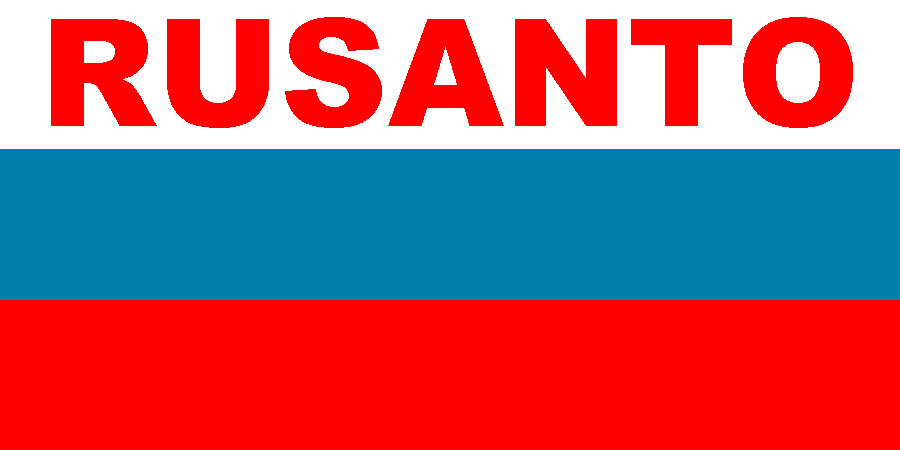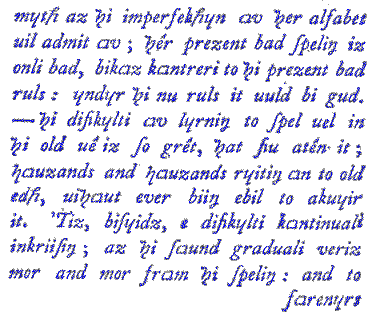Unlike many other languages, English spelling has never been systematically updated and thus today only partly holds to the alphabetic principle. As an outcome, English spelling is a system of weak rules with many exceptions and ambiguities.
The English alphabet has several letters whose characteristic sounds are already represented elsewhere in the alphabet. These include X, C or K, and Q.
It is argued that spelling reform would make the language easier to learn, raise literacy levels, and save time, money and effort.
Advocates note that spelling reforms have taken place already, just slowly and often not in an organized way. There are many words that were once spelt un-phonetically but have since been reformed. For example, music was spelt musick until the 1880s, and fantasy was spelt phantasy until the 1920s. For a time, almost all words with the -or ending (such as error) were once spelt -our (errour) and almost all words with the -er ending (such as member) were once spelt -re (membre). In American spelling, most of them now use -or and -er, but in British spelling, only some have been reformed.
Pronunciations gradually change and the alphabetic principle that lies behind English (and every other alphabetically-written language) gradually becomes corrupted. Advocates argue that if we wish to keep English spelling regular, then spelling needs to be amended to account for the changes.
Here is an example of "Cut Spelling" a reform proposal: "Wen readrs first se Cut Spelng, as in this sentnce, they ofn hesitate slytly, but then quikly becom acustmd to th shortnd words and soon find text in Cut Spelng as esy to read as Traditionl Orthografy, but it is th riter ho really apreciates th advantajs of Cut Spelng, as many of th most trublsm uncertntis hav been elimnated."
Phonetics
Phonemes are represented as follows, with nearest possible IPA equivalent.
Notation IPA Example
a /æ/ sat
e /ɛ/ set
i /ɪ/ did
o /ɑː/ dot
u /ʌ/ cut
Notation IPA Example
ae /eɪ̯/ sundae
ee /iː/ see
ie /aɪ̯/ die
oe /oʊ̯/ toe
ue /jʊː/ cue
Notation IPA (Gen. Amer.) IPA (RP) Example
ar /ɑr/ /ɑː(r)/ bar
er /ɛr/ /ɛː(r)/ merger
or /ɔr/ /ɔː(r)/ for
Notation IPA (Gen. Amer.) IPA (RP) Example
arr /ær/ /ar/ marry
err /eɪ̯r/ /ɛɪ̯r/ cherry
orr /ɔr/ /ɒr/ sorry
Notation IPA (Gen. Amer.) IPA (RP) Example
air /eɪ̯r/ air
aa /ɑː/ alm
eer /iːr/ beer
oo /uː/ moon
uu /ʊ/ book
oi /ɔɪ̯/ oil
ou/ow /aʊ̯/ out
au/aw /ɑː/ saw
ur /ɔr/ /ʊə(r)/ tour
uer /jər/ /jʊə(r)/ cure
Notation IPA Example
b /b/ bat
c/k /k/ cat, kit
ch /t͡ʃ/ chat
d /d/ did
f /f/ fat
g /ɡ/ gag
h /h/ hat
j /d͡ʒ/ jet
l /l/ let
m /m/ met
n /n/ net
ng /ŋ/ singing
nk /ŋk/ ink
p /p/ pep
q /kʷ/ quake
r /ɹ/ red
s /s/ set
sh /ʃ/ shed
t /t/ tot
th /θ/ thin
th /ð/ this
v /v/ van
w /w/ war
wh /ʍ/ why
x /ks/ box
y /j/ yes
z /z/ zoo
zh /ʒ/ azure
Exceptions and other differences
U, meaning "you", is capitalized.
Common words
There is no change in the words was, as, of, the, he, she, me, we, be, do, to, and off. Words derived from these (such as being, together, and thruout) also remain unchanged. Words ending in -ful remain unchanged.
Word-final S
There is no change in the plural suffix -s (as in jobs), the possessive suffix -'s (as in man's), and in the third person present singular verb suffix -s (as in he runs), even though in all these cases the s is sometimes pronounced [z].
"Th" digraph
There is no change in the digraph th, even though it can be pronounced as voiced [ð] or unvoiced [θ]. Similarly the letter x is retained for both voiced [gz] and unvoiced [ks]. The reason may be that unvoiced occurrences outnumber the voiced 5 to 1, and words normally calling for a voiced x are understood even if pronounced unvoiced.
Schwa
There are usually no changes in the spelling of short (schwa) vowels in the unstressed syllables of words like organ, novel, pencil, and lemon, unless the spelling would otherwise indicate an over-pronunciation of the word (as in mountain).
Stress
Depending on its position in the word or root, the unstressed "half ee" (as in between, detect, reform, champion, editorial, hapyer, and fifty) continues to be spelled as e, i, or y.
Double "rr"
As in traditional orthography, indicates that the preceding vowel is short (as in carry, merry, and sorry).
Double ll
Indicates that the preceding a is pronounced English pronunciation: /ɔː/, as in fall, tall, and call.
Word-final O and I
The long o or long i sound at the end of a word may be written with a single letter, as in banjo, go, so, alibi, hi, fli, mi (but banjoes, alibieing, flies, etc., since the vowel is no longer at the end of the word).
Ambiguous syllable breaks
A hyphen following a vowel unambiguously separates a long vowel from another vowel following, as in re-enter and co-operate.
False diphthongs
If two vowels—such as ea—do not match a digraph on the SoundSpel chart, then the syllable ends with the first vowel: react (ea is not a digraph), jeenius, memorial, creaetiv. In cases of more than two vowels the syllable ends with the first digraph: flooid (oo, being the first digraph, ends the syllable—it is not flo-oid), hieest, freeing, inueendo, power, continueing, paeabl, evalueaet.
An example: The Star by Herbert George Wells
It was on the ferst dae of the nue yeer the anounsment was maed, allmoest siemultaeniusly frum three obzervatorys, that the moeshun of the planet Neptune, the outermoest of all planets that wheel about the Sun, had becum verry erratic. A retardaeshun in its velosity had bin suspected in Desember. Then a faent, remoet spek of liet was discuverd in the reejon of the perterbd planet. At ferst this did not cauz eny verry graet exsietment. Sieentific peepl, however, found the intelijens remarkabl enuf, eeven befor it becaem noen that the nue body was rapidly groeing larjer and brieter, and that its moeshun was qiet different frum the orderly progres of the planets.
Lastly lets look at Benjamin Franklin's idea for English spelling reform:
Benjamin Franklin took great interest in the promotion of spelling reform. While living in London in 1768 he wrote A Scheme for a new Alphabet and a Reformed Mode of Spelling in which he proposed a fairly accurate phonetic system for spelling English. The alphabet was published in 1779 in Franklin's Political, Miscellaneous, and Philosophical Pieces.
His new phonetic alphabet consisted all the lowercase letters of the Latin alphabet, minus c, j, q, w, x, and y, which he thought redundant, plus six new letters for sounds which he thought lacked unambiguous orthographic representation. The other letters all adhered to the principle of one symbol (or unique digraph) per one sound.
Franklin commissioned a type foundry to prepare a suitable type including for the 6 new letters, but soon lost interest in his alphabet. The only other person to show an interest was Noah Webster.
Notable features
Double vowels represent long vowel sounds, e.g. aa = [ a: ] and ii = [ i: ].
Only one accented letter appears in the alphabet: ê, which represents the a in mane and lane.
Consonant combinations are used to represent such sounds as the ch in chew and the j in jaw.
Here is a sample of text:
Transliteration:
Much as the imperfections of the alphabet will admit of; the present bad spelling is only bad because contrary to the present bad rules: under the new rules it would be good -- the difficulty of learning to spell well in the old way is so great, that few attain it; thousands and thousands writing on to old age, without ever being able to acquire it. 'Tis, besides a difficulty continually increasing; as the sound gradually varies more and more from the spelling: and to foreigners.


